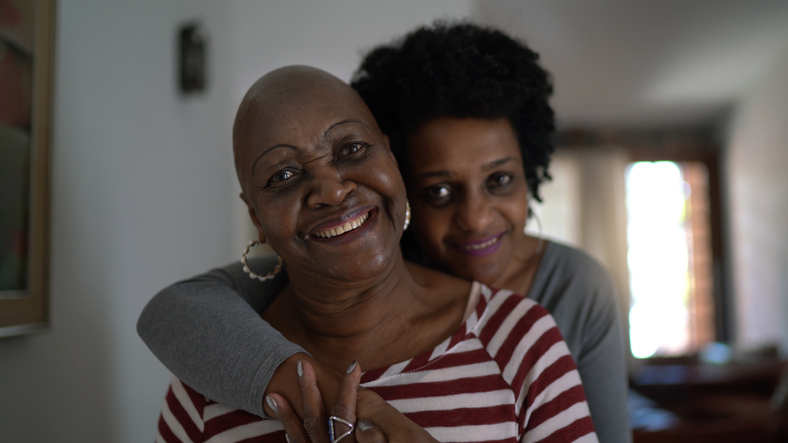Preparing For An Adult Child Moving Back Home
Share the post
Share this link via
Or copy link

Source: Hispanolistic / Getty
The number of young adults (ages 18 to 29) living with their parents rose by five percent (from 47 to 52) between February of 2020 and July of 2020. What happened between those months? We all know. Considering that as of January of 2020, 78 percent of Americans were living paycheck to paycheck, it should come as no surprise that the pandemic-triggered job loss sent many young adults back under mom and dad’s roof. The $1,200 stimulus check and weekly unemployment can keep some young adults living independently, but not all – and certainly not those living in metropolitan areas where rents are astronomical.
Moving back home during any point of adulthood can be emotionally trying. Young adults fresh out of college probably feel robbed of the chance to begin their lives. Young adults who are closer to their late 20 may struggle with issues of self-esteem, and feel a particular disdain for having to go of an independent lifestyle to which they’ve grown accustomed. But, people do what they have to in order to survive right now. And for many parents, that means welcoming their grown child back into their home. We spoke with a licensed marriage and family therapist Altagracia Y. Andre (IG: altagracia_lmft) of Caring Therapists about how both parents and children can adapt to this change.

Source: she has full rights to these / na
Handling pre-existing issues
They say space can be the best thing for a relationship, and if that was true of your relationship with your family, then moving back home can pose this issue: will you get into all the same arguments you did the last time you lived with them? If so, Andre says, “Communication is key here! If there were any strained relationships or frequent conflict that existed, you will want to address those issues prior to moving forward.”

Source: SDI Productions / Getty
You may need a little help
Love MadameNoire? Get more! Join the MadameNoire Newsletter
We care about your data. See our privacy policy.
With regards to resolving old conflicts before starting a new life with your family, Andre suggests, “Should it be difficult to bring up these issues on your own, you may seek the help of a counselor who can help you navigate those difficult conversations and come to a resolution. As a family, discuss your expectations of each other, ground rules, and boundaries.”

Source: FreshSplash / Getty
Will the child ever leave again?
It doesn’t feel kind to ask this question, but the reality is that of course both the parents and the kids hope the situation isn’t permanent. It’s likely not good for either party – at least not for an extended period of time. In fact, research has found that, when adults move back home, it can be difficult for the parents’ wellbeing. Keep in mind that, after handling the grief of kids fleeing the nest, parents then adapted. They developed new routines. They got over the sadness of having the child gone, and found joy in a new phase of life. Now…everything is moving backward.

Source: The Good Brigade / Getty
How to keep an adult kid on track
With the last slide in mind, we asked Andre how parents can support their adult kids in making sure they stay on track with goals and move in the direction of independence again. “Parents can ensure they’re helping their child find structure and rebuild their confidence by providing a listening ear through active listening, validating the emotions they are expressing, asking questions to ensure there’s clarity in what is being communicated, and providing support as needed.”

Source: FG Trade / Getty
Boundary issues that may occur
“Having a child return home can be difficult on both parties. Your child may be a different individual now than when they left home. Some of the boundary issues that may come up during this time may include visitors in the time of a pandemic, privacy issues, and lack of respect for personal space and choices,” says Andre.

Source: kate_sept2004 / Getty
Handling boundary issues
In order to prevent boundary issues, talking things out is key, according to Andre. “To respect one another’s boundaries, you will want to listen fully as the boundaries are communicated, understand the verbal and non-verbal cues that may indicate that something may be a boundary violation, and refrain from giving unsolicited advice.”

Source: Ivan Pantic / Getty
Parents, resist the urge to say…
We asked Andre what comments or questions parents should refrain from asking (too much) during this time. Her answer: “’Have you found a job yet?’, ‘Don’t waste your time with that job’ ‘Are you sure you don’t want to go back to school?’ And all the other subtle statements as well as comparisons which can further exacerbate their stress and ultimately be harmful.”

Source: Anna Frank / Getty
Remember, these are extenuating circumstances
Andre reminds us not to respond to a temporary circumstance as if it’s a new, permanent reality. And, to keep conversations as dialogues rather than monologues. “If we were not in a pandemic and an economic crisis, they would still have their job, therefore, remember to show them some grace during this time. As an adult, your child will be more receptive to a conversation leading to solutions rather than a lecture.”

Source: AJ_Watt / Getty
Have empathy for their age group
Backing up Andre’s point about showing some grace to young adults, it’s important to know that this age group was hit very hard. Over half of young adults between the ages of 18 and 30 state that either they or someone in their household took a financial hit due to COVID-19. Low-income workers and young adults are the most likely to lose income due to the pandemic. So, your kid isn’t the only one who couldn’t make ends meet right now. Her entire demographic is struggling.

Source: FG Trade / Getty
Be grateful for the time together
“If there is one thing this pandemic has taught us it is that there are many things we might have taken for granted. Gratitude is key here! This could be a great opportunity to reconnect with each other and engage with each other as adults,” says Andre. “Many people have lost family members during this time that they may have taken for granted. Address and resolve any past conflict and cherish the little moments.”







